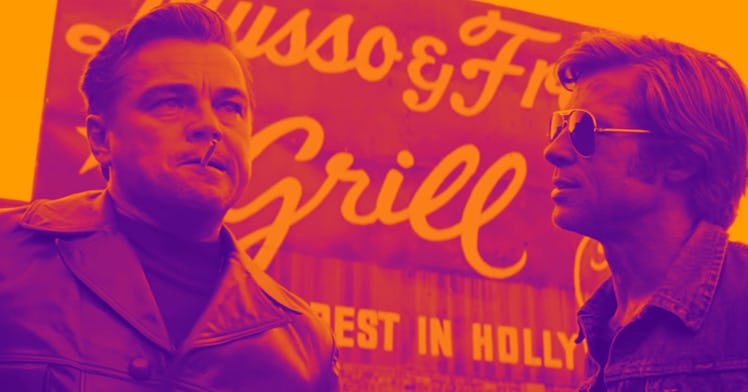Quentin Tarantino Is Murdering Baby Boomer True Crime Nostalgia
‘Once Upon a Time In Hollywood’ isn’t just a tinseltown fairytale; it’s aiming a flamethrower at cultural obsessions we might want to leave behind.

There’s a specific way that Brad Pitt drives his car in Once Upon a Time In Hollywood that clues the audience in on the swerve of the movie’s plot. As Cliff Booth, Pitt very precisely tears ass down the freeways of Los Angeles. This is probably meant to remind viewers of Steve McQueen’s Bullitt or The Italian Job or a Connery-era Bond movie, but those movies usually contain crashes and cops. This one doesn’t. There are no consequences. There’s barely even gravity. And that is, in a sense, what Quentin Tarantino’s latest ode to movies, himself, and Leo and Brad’s character trajectories are really about: Redlining the history books.
If you care about spoilers, now would be a good time to leave. It’s impossible to meaningfully talk about Once Upon a Time in Hollywood without talking about the ending (same nevermind as Inglorious Basterds). Initially, the film does for 1969 what the latest season of Stranger Things did for 1985, but then the White Album skips. It becomes clear that Tarantino isn’t just nostalgic, he’s sad. The question he poses is this: “What if the sixties ended well?”
That translates in Tarantonian to… “What if the sixties ended with Sharon Tate alive?”
Margot Robbie as Sharon Tate (Credit: Sony/Columbia)
In real life, on August 8, 1969, three members of Charles Manson’s “family” cult murdered Sharon Tate, Jay Sebring, Wojciech Frykowski and Abigail Folger. The brutality of this is famous and disgusting. You can look it up. Sharon Tate was also pregnant at the time. This killing would subsequently inspire the following pop cultural products: Helter Skelter Murders (1972) Manson (1973), Helter Skelter (1976), Six Degrees of Charles Manson (2008) not to mention several films released (or set to be released) this years including Charlie Says, The Haunting of Sharon Tate and a miniseries called Tate. This is an incomplete list by a long shot. Get it? People are obsessed with this event, and for decades there’s been a pervasive niche of the entertainment industry which relied on this tragedy as a source of creep-out material.
The murders would also inspire the now-tired cultural debate around the 1960s (were they bad!?) that has long been a political backdrop for partisan grandstanders. So, in pulling together the idea of the 1960s as controversial with the idea of the Manson Family murders as the birth of a specific type of blood-soaked storytelling, Tarantino gets a strong grip on a strained tendon within the body politic. Then he pulls.
By allowing his characters —a has-been action TV star and his stunt double — to derail history with nothing but a rusty gun, an attack dog and a flamethrower, Tarantino mocks not only the fragility of the entire cultural narrative around the 1960s, but also true crime as a genre. Once Upon a Time In Hollywood seems to suggest that, in contrast to Boomers, he believes entertainment should be about entertaining people, not regurgitating gore or relitigating some half-imagined past. Tarantino isn’t confused about how we should feel about Charles Manson. And he’s probably also not a huge fan of Mindhunters.
The funniest elements of the movie come from Tarantino’s correct rejection of the idea that Manson’s motivations were even interesting (dude thought “Helter Skelter” was about a race war so there’s no need to hear him out). In Once Upon a Time In Hollywood, sanity and decency take center stage. And then they torch crazy. It’s really, really satisfying to watch.
Credit: Columbia/Sony
When the Tarantino-branded bloodbath eventually happens in this movie, it’s the good guys who are doing the killing, all in the name of protecting beauty and truth, represented here by Margot Robbie’s endlessly convincing and likable Sharon Tate. Is this all a bit silly? Sure, but it’s good silly. It’s old-school Hollywood silly.
And, look, if it takes a flamethrower to get all of these Serial-knock-off true crime movies, shows, podcast, books, and god damn Instagram accounts out of my feeds, I’m down to hand Leo the flamethrower. There is, after all, something to be said for watching nice guys finish first. I want that experience for my kid and I want it for myself. When history doesn’t provide it, maybe we just have to make do.
Once Upon a Time In Hollywood is out in theaters now.